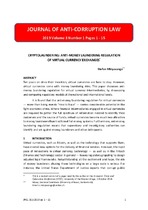| dc.contributor.author | Mbiyavanga, Stefan | |
| dc.date.accessioned | 2022-02-07T10:48:45Z | |
| dc.date.available | 2022-02-07T10:48:45Z | |
| dc.date.issued | 2019 | |
| dc.identifier.citation | Mbiyavanga, S. (2019). Cyptolaundering: Anti-money laundering regulation of virtual currency exchanges. Journal of Anti-Corruption Law, 3(1), 1-15. | en_US |
| dc.identifier.issn | 2521-5345 | |
| dc.identifier.uri | http://hdl.handle.net/10566/7182 | |
| dc.description.abstract | Ten years on since their invention, virtual currencies are here to stay. However,
virtual currencies come with money laundering risks. This paper discusses antimoney laundering regulation for virtual currency intermediaries, by showcasing
and comparing regulatory models at the national and international levels.
It is found that the anti-money laundering regulation for virtual currencies
— more than being merely “nice to have” — carries considerable potential in the
fight economic crime. Where financial intermediaries engaged in virtual currencies
are required to gather the full spectrum of information needed to identify their
customers and the source of funds, virtual currencies become much less attractive
to money launderers than traditional fiat money systems. Furthermore, anti-money
laundering regulation means that supervisory and investigatory authorities can
identify and act against money launderers and other delinquents. | en_US |
| dc.language.iso | en | en_US |
| dc.publisher | University of Western Cape | en_US |
| dc.subject | Cryptolaundering | en_US |
| dc.subject | Anti-money laundering regulation | en_US |
| dc.subject | Money laundering | en_US |
| dc.subject | Corruption | en_US |
| dc.subject | Virtual currency | en_US |
| dc.title | Cyptolaundering: Anti-money laundering regulation of virtual currency exchanges | en_US |
| dc.type | Article | en_US |

